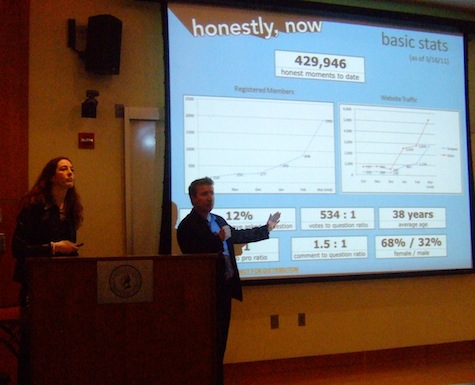I had a lot of fun listening to Craig Kanarick, the co-founder of Razorfish, the proto-interactive agency, at last night’s Hoboken Tech Meetup.
I could definitely envision him pitching Fortune 500 companies during the dot-com years and explaining the Web to the “suits”. Did he really do a presentation once-upon-a-time with his hair dyed blue?
No matter. He’s still at it, and yesterday he radiated lots of thought beams on the current digital technology environment. As part of his talk, Kanarick delivered a completely entertaining and spot-on summary of our post-WW II consumer economy—rise of marketing, power of brands, and now the preeminence of real-time on-demand media.
One idea of his that most resonated with me, considering the context of speaking at a tech meetup and having just followed a few demos, is the challenge of being a tech entrepreneur when there is so much open and available IT.
Paging Nick “IT Doesn’t Matter” Carr!
I am a follower of Nick Carr’s view— with some qualifiers—that it’s getting harder and harder to gain a competitive advantage just on the technology. As Kanarick pointed out in referring to the evening’s demos, intellectual property alone will not sway consumers.
Netflix, which was one of Kanarick’s case in points, may have a slightly better recommendation algorithm than others, but who cares? The site is as sterile as a steel file cabinet.
There’s so much good off-the-shelf software for generating suggested product matches—pick from bayesian, nearest neighbor, term vectors, etc.—that any capable entrepreneur can get close enough to what a competitor’s in-house team of PhDs have cooked up, and doing it without breaking their bank accounts.
So Kanarick could be right, that Netflix may enter some choppy competitive waters unless they deliver more of a customer experience and prove they really, really love movies.

Bob Petrie and Tereza Nemessanyi, co-founders of honestly, now
This all leads to one of the demos last night that I really enjoyed.
The company is called honestly, now. They are a Q&A site. YAQAS. But …
The queries for this site are focused on personal appearances, job, and relationships, as in “Is this the right suit to wear for an interview?” with each Q accompanied by an uploaded picture.
In addition to the community voting on answers, both “Fab 50” national experts and local professionals heavily concentrated in the areas of etiquette, clothing, hair styling, and health, proffer their own advice and wisdom.
In other words, the big players (Bonnie Fuller, former editor-in-chief of Us magazine is one of the “50” ) have a way to extend their brand while local merchants can earn consumer trust and build their businesses.
Smart model (the pros pay a subscription fee) along with an active community of over 2000 members and growing make this, I believe, a very engaging virtual space.
And honestly rhymes nicely with Food 52, the community recipe site I’ve written about, that also has both amateur cooks and pros (New York Times’ Amanda Hesser) offering recipes and advice.
In both cases, it’s not about the technology; it’s the community, their collective knowledge, and the service and experience provided.
Related articles
- Nick Carr’s Blog (roughtype.com)
- honestly, now
- New York Tech Meetup Holiday Extravaganza (technoverseblog.c0m)


